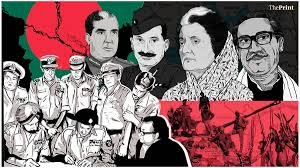The Liberation War of Bangladesh, which officially began in March 1971, was not a spontaneous conflict but rather the culmination of years of political disillusionment, systemic discrimination, and betrayed democratic aspirations. The struggle for sovereignty was deeply rooted in the historical and structural injustices that plagued East Pakistan long before the war broke out.
In the years leading up to 1947, the people of East Bengal (now Bangladesh) were instrumental in the creation of Pakistan. Through their overwhelming electoral support, they helped turn the dream of a separate Muslim homeland into a reality. It was widely believed that Pakistan, founded on religious unity, would rise above sectarian divisions and emerge as a genuinely democratic and inclusive state.
However, post-independence realities quickly shattered those hopes. For the people of East Pakistan, it became increasingly evident that they were treated as second-class citizens in the new country. Despite comprising the majority of Pakistan’s population, East Pakistanis found themselves marginalized politically, economically, and culturally.
A powerful and exploitative triad soon emerged in West Pakistan, composed of:
- Dominant business conglomerates,
- The military establishment, and
- A centralized civil bureaucracy — what renowned Pakistani sociologist Hamza Alavi referred to as an “overdeveloped state.”
These forces monopolized power at the centre, effectively denying East Pakistan any real participation in governance or fair resource distribution. The West Pakistani elite viewed the eastern wing with suspicion and condescension, often portraying its people as culturally inferior and politically immature.
The final blow to democratic hopes came in 1958, when the Pakistani military seized control, marking the beginning of authoritarian rule. The new regime was not just a military dictatorship but a strategic tool used by the elite alliance to suppress dissent and block the emergence of a federal, participatory system that East Pakistan had long demanded.
🇧🇩 The Seeds of Liberation
The systemic exclusion of East Pakistanis from the political mainstream, combined with the denial of linguistic and cultural recognition, led to growing unrest. The Language Movement of 1952, followed by political movements for autonomy and fair representation, laid the groundwork for a much larger liberation movement.
By the late 1960s, calls for economic justice, political equality, and cultural dignity had intensified, culminating in the historic 1970 general elections, where the Awami League, led by Sheikh Mujibur Rahman, won a landslide victory. But the West Pakistani establishment’s refusal to transfer power became the final betrayal.
It was against this backdrop of broken promises, military suppression, and institutionalized inequality that Bangladesh’s call for independence gained unstoppable momentum in March 1971 — ultimately leading to the nine-month Liberation War and the birth of a sovereign nation on December 16, 1971.

